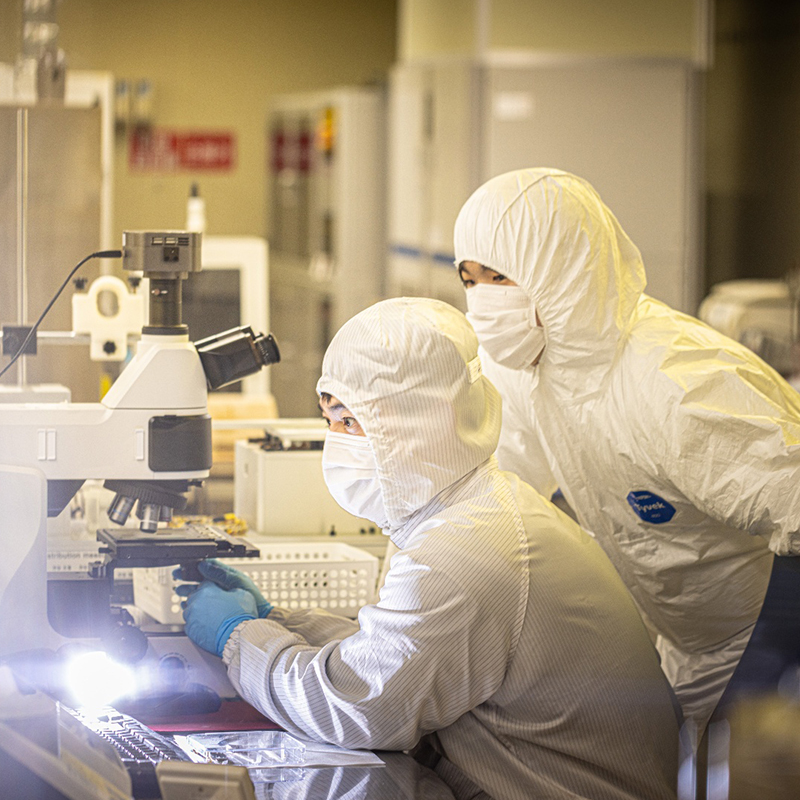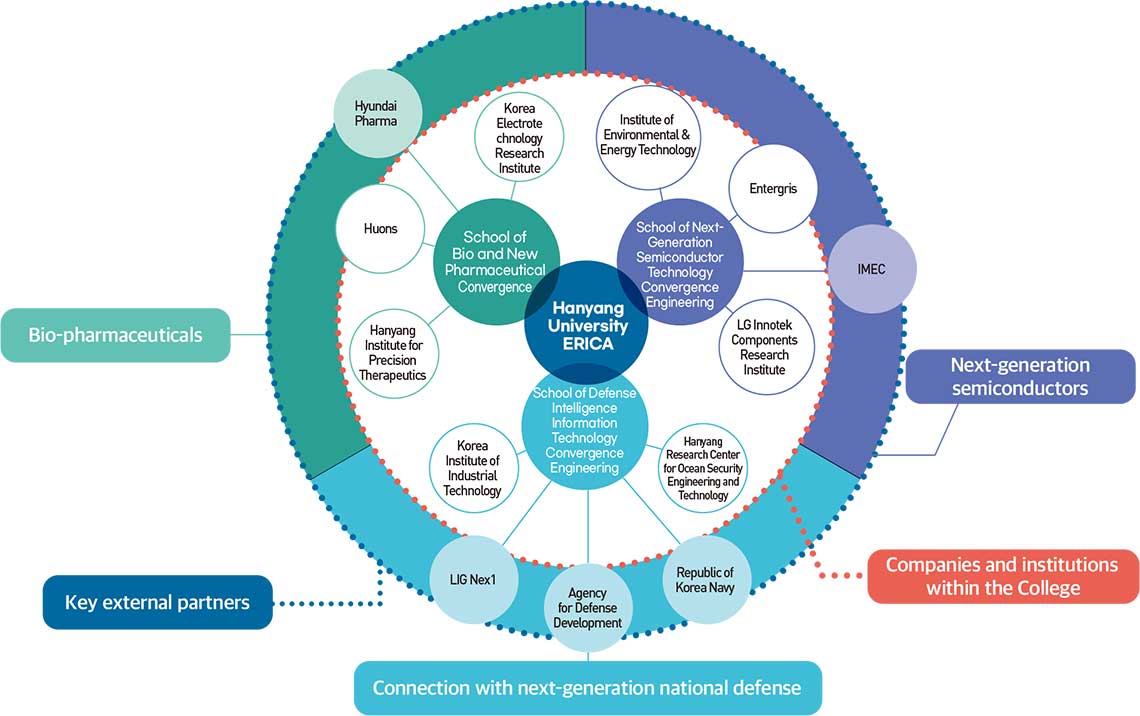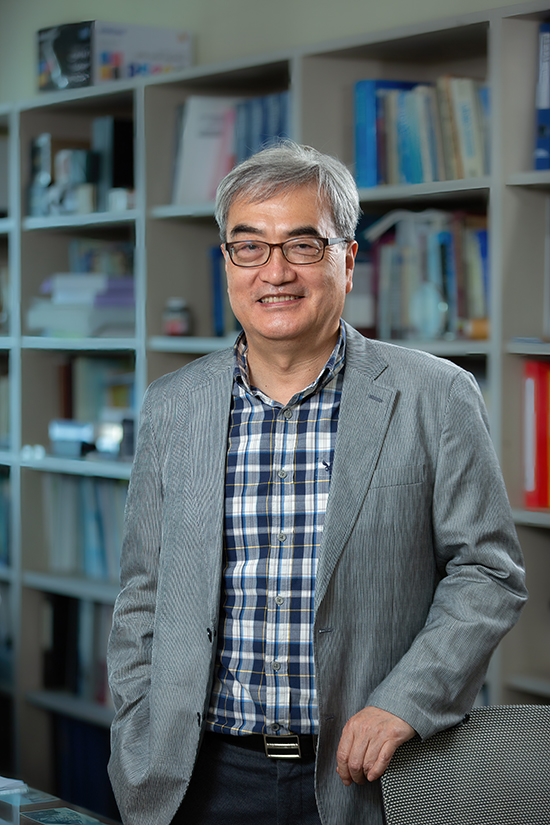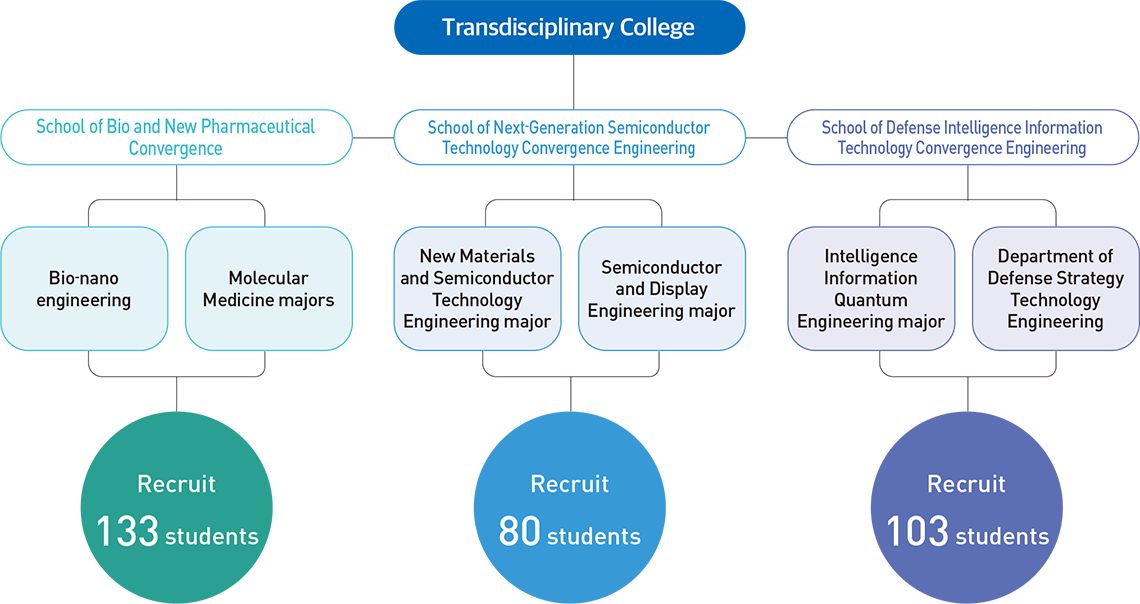THEME ➀
Establishment of the Transdisciplinary College
ERICA, a University Preparing for the Future
Chairman JongRyeol Kim of the committee preparing for the establishment of a Transdisciplinary College (Department of Materials Science & Chemical Engineering)
ERICA is about to recruit students for its new Transdisciplinary College from the 2025 school year. At a time when winds of change are blowing in accordance with the nation’s policy of nurturing talent, ERICA is thriving as a result of its stable foundation built over a long period of time. It is time for ERICA, which is prepared for cutting-edge technologies, and has developed strong capabilities in convergence, to display its capabilities through the newly established Transdisciplinary College.
- Written by · YeonJoo Lee
- Photo by · HongBeom Ahan, External Affairs and Development Team

Optimal conditions for the Transdisciplinary College
Five core areas ― future aerospace mobility, bio-health, advanced parts and materials, digital; and environmental energy ― were selected as essential fields for sustaining national competitiveness at a 2023 joint meeting of relevant government ministries. In order to establish a talent-nurturing system in these relevant areas, each university is actively reorganizing its academic systems. Relating to the five core areas mentioned above, ERICA plans to establish the Transdisciplinary College to focus on the areas of semiconductors, bio, and defense aviation drones. Support for this program has gained momentum particularly as ERICA has strengths in the five core areas announced by the government.
“The bio- area can be divided into the pharmaceutical and diagnostic sectors. If we can integrate related departments such as ERICA’s College of Pharmacy, the Department of Bio-Nano Engineering, and the Department of Molecular & Life Sciences, we can expect greater synergy. In particular, in the field of advanced parts and materials, we are expecting to have close cooperation with the industrial sector thanks to our geographic proximity to the Yongin Semiconductor Cluster, and the Banwol and Sihwa Industrial Complexes that supply parts. In addition, since ERICA has already collaborated with the Department of Military Information Engineering and other related departments that signed contracts for early implementation, and because the university has also provided military officer-linked education, it can provide a very effective environment for fostering advanced human resources in the relevant fields,” Commented Chairman JongRyeol Kim of the committee preparing for the establishment of the Transdisciplinary College.
Chairman Kim also explained that the Department of Materials Science & Chemical Engineering, and the Department of Nano-Optoelectronics, which specialize in semiconductors and displays, will be the core axes of the semiconductor field. He also mentioned that since the future technologies in the digital field are related to quantum computers, the utility of defense-related research based on these technologies will also increase. He emphasized that ERICA’s education system and its interdisciplinary convergence programs will create synergy through the Transdisciplinary College. Together, they are expected to effectively form the framework of the Transdisciplinary College due to ERICA’s location, infrastructure, and research resources perfectly matching the direction pursued by future industries. Furthermore, ERICA’s strength in industry-university cooperation is expected to be key to further advancing substantial research and fostering of high-quality personnel.
“It is clear that ERICA’s foundation is based on the idea of defending national security with technology, and the university has been successfully operating its academic-research-industry cooperation system. At ERICA, where national and corporate research facilities have been famously established, innovative companies in the bio, semiconductor, and advanced materials fields also plan to move into the campus via the campus innovation park. The Transdisciplinary College is thus expected to become a very effective center of convergence education to nurture talent while strengthening the university’s research capabilities,” Chairman Kim said.

Chairman Kim also emphasized that ERICA’s favorable infrastructure and location with the Academic-Research Cluster and Campus Innovation Park are strong advantages. Projects to develop the Gyeonggi Semiconductor Mega Cluster, Ansan Small but Strong Research Special Zone, Smart Industrial Complex within the Banwol-Sihwa Industrial Complex, and the Ansan Science Valley project are all being carried out in cooperation with ERICA. Such close connection with the local governments are essential for the education system and will further serve as a very important base for students to advance into relevant fields after graduation. The Transdisciplinary College is expected to play an important role in promoting practical cooperation based on these factors.
We will create an effective
curriculum and establish a
support system for convergence
education so that students can
enjoy substantial benefits.

 Chairman Kim said ERICA will provide an effective education through in-depth career planning, and IC-PBL and QBL-based on convergence technologies in the Transdisciplinary College.
Chairman Kim said ERICA will provide an effective education through in-depth career planning, and IC-PBL and QBL-based on convergence technologies in the Transdisciplinary College.
Ranked first in the entire metropolitan area and Seoul,
Securing a 106 net increase of students in undergraduate admissions
ERICA was able to effectively move forward in establishing the Transdisciplinary College, particularly as the university has been strengthening its geographic advantage and educational infrastructure over a long period of time. In particular, ERICA has recently demonstrated its attractiveness to students by securing a net increase of 106 freshmen in undergraduate admissions in the technology field for the 2025 school year, according to the Ministry of Education. As a result, ERICA currently ranks first in Seoul and the metropolitan area for new students admission for 2025. The favorable capability indicators of ERICA have undoubtedly contributed to the recent increase in admissions, proving again that ERICA is becoming increasingly more competitive to enter. Chairman Kim believes that ERICA’s firm foundation in education and cooperation along with its research competitiveness, have likewise contributed to this soaring admissions increase.
“I believe that ERICA’s competitiveness is fundamentally supported by its excellent research capabilities rooted in its industry-academia research system and the capabilities of our faculty. I firmly believe that the outstanding efforts of our faculty and ERICA members who were willing to accept and implement the radical idea of establishing a new college, and the students who understood and supported the development plan of ERICA, were the driving forces behind this excellent achievement,” commented Chairman Kim.
He also firmly believes that it is difficult to establish the Transdisciplinary College without the fundamental support of university research competitiveness, including the BK21 project with its stage-4 project already underway. ERICA is still facing challenges to secure support for research and competitive researchers, but ERICA’s solid foundation of research capabilities has served as a driving force behind the establishment of ERICA’s Transdisciplinary College. The future of a university is determined by the direction it pursues and the perspectives and will of the faculty. For instance, through its free transfer system, researchers have been given a wider range of choices, and students have also been provided wider opportunities to participate in education and research in cutting-edge convergence fields. Furthermore, the capabilities of talented students required by high-tech industries and curriculums that can provide the capabilities and field experience required by such industries will lead to the further cultivation of future talent who possess the necessary core capabilities.
ERICA’s commitment to cutting-edge (advanced) convergence programs
“The talent that the Transdisciplinary College would like to nurture are intelligent individuals who have expertise and are equipped with a convergence mindset and related attitudes. The are also future professionals who possess problem-solving skills and the ability to utilize artificial intelligence, while understanding the need to innovate. In this regard, students must be ready and willing to actively address social issues, while also being able to pioneer their own career paths. To support these endeavors, ERICA will provide education with in-depth career planning and IC-PBL (Industry-coupled Problem-Based Learning) and QBL (Question-based Learning),” said Chairman Kim.
ERICA’s Transdisciplinary College consists of a group of advanced convergence studies that emphasize the strengths of existing organization in government-led new technology development fields. Since it is essential to organize an educational curriculum that can contribute to future industries while effectively utilizing existing research infrastructure, ERICA researchers plan to come up with specific measures to strengthen its convergence capabilities. According to Chairman Kim, the Transdisciplinary College will seek long-term development with support from professors, students, and the university.
He commented, “First of all, we will significantly increase the number of professors in cutting-edge fields over the next five years to secure capable educators required in each field, and support student career planning and AI education. We will also form a curriculum and establish a support system through collaboration with professors in other fields for convergence education. Above all, we will establish educational programs and provide exceptional scholarship support so that students can enjoy substantial benefits.”
Convergence often comes with concerns over academic legitimacy. Chairman Kim pointed out that the legitimacy of science is based on basic studies and that ultimately, true convergence can be achieved when people give up their obsession with their own studies. The first step in convergence education is to enable students to discover various possibilities through diverse studies. The Transdisciplinary College is expected to provide a new platform for learning for students of ERICA, leading to the creation of new values needed in the future.







